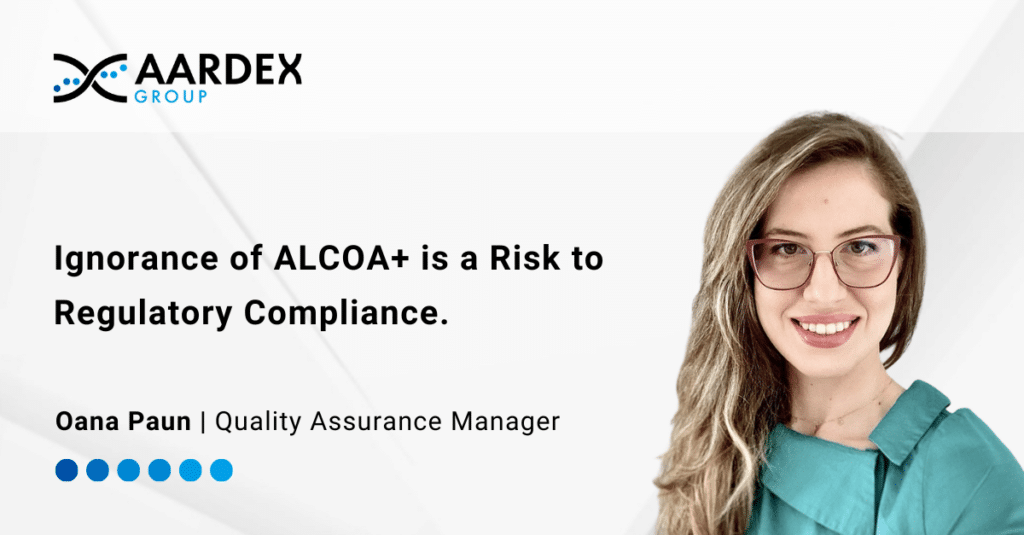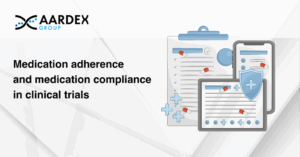In this article, AARDEX Group Quality Manager, Oana Paun, discusses ALCOA+ and its importance for achieving regulatory compliance.
Not all data is created equal
For those with a scientific ear, it can be reassuring when you hear ideas discussed in terms of data. The word alone has the power to move things from subjectivity, conjecture and opinion, with their amorphous boundaries, into the more solid territory of evidence and facts.
But, as scientists will also know, it can be dangerous to apply meaning based on a label alone. Just because a point of information is defined as ‘data’, questions still should be asked over its genesis and its validity – because while all data has a level of integrity, some data undoubtedly has more integrity than others.
The critical role of data integrity in pharma
The importance of data integrity to the pharmaceutical industry is self-evident. The availability of evidentially robust, scientifically valid information provides a critical platform to advance the development and production of treatments that are both efficacious and safe for patients. In acknowledgement of this point, regulatory bodies across the globe have incorporated desirable principles for the gathering and recording of data within official guidance documentation.
Examples here include Parts 11, 210, 211 and 820 within Title 21 of the US Food & Drug Administration’s Code of Federal Regulations (21 CFR), which covers aspects of data integrity related to electronic records, Good Manufacturing Processes (GMP), and quality system regulations.
Data integrity is also highlighted in the guidelines of the International Council for Harmonisation of Technical Requirements for Pharmaceuticals for Human Use (ICH), including ICH Q9 (Quality Risk Management) and ICH E6 (Good Clinical Practice), which emphasize the importance of accurate and reliable data in pharmaceutical quality systems and clinical trials.
Best-practice approaches to data are also outlined within the European Medicines Agency’s Guidelines on Good Manufacturing Practice and Good Clinical Practice, as well as the UK Medicines and Healthcare products Regulatory Agency’s guidance on data integrity.
ALCOA+ Data Integrity Framework
Whether explicitly or implicitly, these various directives draw on ALCOA+ as a framework for representing the key principles of data integrity. Although generally applicable, ALCOA+ takes on particular significance within the regulated borders of the pharmaceutical and clinical research industries, where health outcomes and patient safety are predicated on adherence to the highest standards. The framework sets out that data should be:
- Attributable
There should be a clear record of when and by whom the data was generated. This is supported by regulations including 21 CFR Part 11, which requires electronic records to include audit trails for tracking. - Legible
Data should be readable and permanent. This is a basic requirement in documentation practices across various guidelines, including the FDA’s Good Manufacturing Practice (GMP) guidelines. - Contemporaneous
Data should be recorded at the time it is generated. This is a principle underlined in GMP, Good Clinical Practice (GCP), and Good Laboratory Practice (GLP). - Original
The first recording of data, or a certified copy, should be maintained. This concept is embedded in 21 CFR Part 11 and various GxP regulations. - Accurate
Data should be correct and represent what was intended or observed – a fundamental expectation across all GxP regulations.
The ‘+’ element of ALCOA+ signifies a number of other characteristics that have influence over data integrity and are expected to be satisfied under GxP recording practices. These are:
- Complete
All data, including any repeats or rejections, should be recorded. - Consistent
All elements of the dataset, such as date and time stamps, should be consistent. - Enduring
Data should be stored in a manner that allows for preservation over time. - Available
Data should be readily available for review and audit. - Traceable
Data should be traceable throughout its lifecycle. Any changes – either to the data or metadata – should be documented and, where necessary, explained, and should not obscure the original information.
Challenges to Data Integrity in Clinical Settings
As outlined above, ALCOA+ provides a highly robust framework for managing data integrity throughout a process. But despite this, and despite advocacy of ALCOA+ among international pharmaceutical regulators, it can be argued that, generally speaking, the standards of ALCOA+ are not being adequately met within the context of today’s clinical trials.
Indeed, ALCOA+ raises a number of uncomfortable questions around data integrity when it comes to common methods of data gathering. The framework demands that risks associated with data are defined and assessed, and that approaches used to reduce risks to an acceptable level should be proportionate to the significance of the risk. Yet, from an objective perspective, traditional, candidate-led reporting methods, such as pill counting, introduce a high level of uncertainty over the integrity of the recorded data – a risk that has the potential to carry serious implications.
By definition, pill counting and self-reporting as data-gathering methods are unvalidated, with inherent assumptions around the integrity of the generated data. The ultimate consequence of this data risk is an inappropriate estimate of efficacy and safety within the trial, which in turn could lead to candidates experiencing more serious side effects, decreased efficacy, and failure of the trial.
How Digital Adherence Measurement Improves Data Integrity
Following this logic, it stands to reason that pharmaceutical companies must look beyond such adherence methods if they are to align their clinical trials with best practice in data integrity and comply with the data guidance set out in various GxP regulations.
In contrast, the medication adherence technology offered by AARDEX – MEMS AS – can be held up as a GxP-compliant solution. Built around user-friendly packaging and devices, and supported by cloud-based software, the technology fulfils all of the requirements set out by ALCOA+ through close monitoring of adherence among trial participants. Most notably, MEMS AS compares favourably to classical data-recording methods on the ‘A’ of accuracy and the ‘C’ of contemporaneous by removing the risk presented by human error in terms of erroneous and delayed reporting. It can also be argued that the technology also adds a further ‘O’ in the form of objectivity, since it eradicates any potential for bias in data gathering and can be independently verified as a process.
Raising the Bar for Future Trials
It has been evident over time that the issue of data integrity in clinical trials has only attracted increasing attention among regulators, and it is likely that higher demands will be applied in this area in years to come with a view to continued improvement of patient safety and overall trial effectiveness.
Such demands can all be met under the framework of ALCOA+, as mandated by regulators and as proven across other GxP processes. However, it remains the case that these principles are inadequately understood and applied in the context of clinical trials – a state of ‘ignorance’ that, rather than bliss, actually represents a compliance risk.
For trial sponsors, the silver lining is that changes to adherence monitoring practices allow this risk to be addressed, because, while it’s true that all monitoring approaches will generate data with a degree of integrity, it’s also true that some methods deliver data with more integrity than others.



